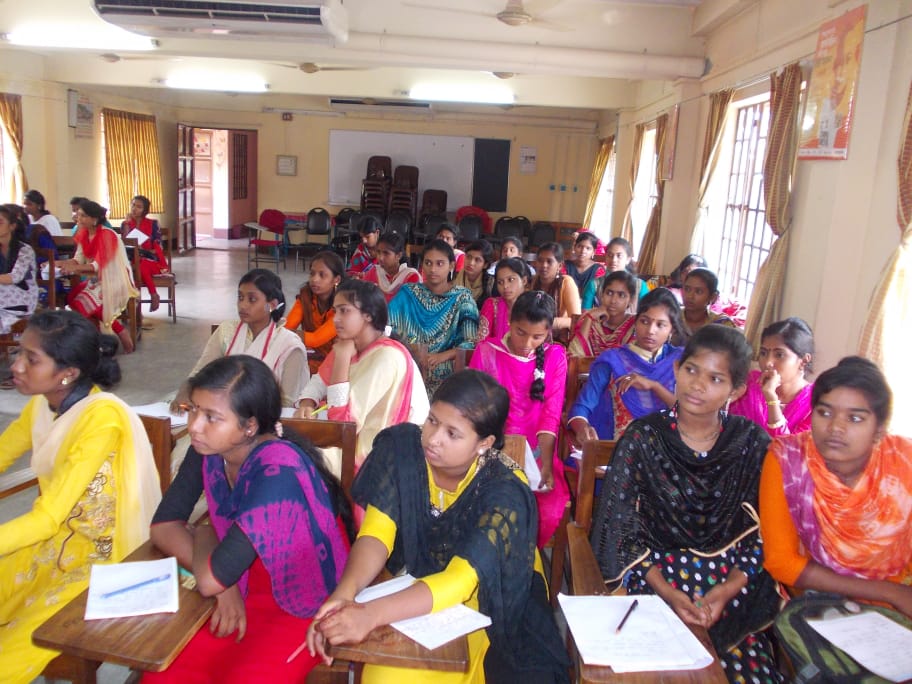Xaverian Missionary: girls, not brides, women, not slaves (photos)
Fr Sergio Targa founded the Kisori Ghoton Prokolpo (Teenage Project) with which he has fought child marriage for 15 years. Early marriages underpin society’s patriarchal structures. For the priest, "We want girls to understand their value. We wish to make them dream.”
Khulna (AsiaNews) – Fr Sergio Targa, a 55-year-old Xaverian priest, has been fighting the child marriage in Bangladesh for 15 years. Based in Satkhira, Khulna Division (south-west Bangladesh), he is behind Kisori Ghoton Prokolpo (Teenage Project) whose goal is for girls to be girls, not brides, and for women be women, not slaves.
"We want to give humanity, dignity, respect” to girls and women, he told AsiaNews. “We want girls to learn that they are valued and are not damaged goods. We want them to be proud of being women and not subjected to society’s patriarchal system."
Born in Brescia (Italy), Fr Sergio has been a missionary in Bangladesh for 24 years. With the initiative he founded he has fought for girls’ education against early marriage, which is still commonplace in the country.
"Often parents do not let their daughters study because they think it’s a waste of money since they will marry men much older than themselves and eventually become slaves to their grooms’ family".
Recently, Save the Children released its third annual Global Childhood Report, which shows that 32.4 per cent of teenagers (aged 15 to 19) are already married in Bangladesh. Of these, 84.4 per cent have children before their 19th birthday. In general, 17.4 per cent of children leave school in the first years of study.
For the Xaverian clergyman, the problem of "early marriage varies according to communal affiliation. Although the population is heterogeneous, 98 per cent is ethnic Bengali and 2 per cent are tribal.”
"Within the Bengali community, regardless of religion or language, caste and group divisions run deep. Endogamy prevails.” More generally, "the practice is to marry young women to older men (by at least 15-20 years).
“The practice is rooted in (Manusmriti,) the ‘Laws of Manu’, an ancient Hindu legal text drafted between the 2nd century BC and the 2nd century AD, whereby fathers must marry off their daughters immediately after their sexual maturation. Thus, if a girl is still at home after her 11th or 12th year, it’s the father’s fault. This idea is rooted in culture, in the mind."
"Other reasons underpin this tradition. The first one is honour: The longer a girl stays at home, the greater the risk for her to escape with a boy of her age, bringing dishonour not only to her family, but to the whole group. The second is dowry: the older the girl, the more the father will have to pay to give her away as a bride to the groom's family."
This said, "for the girl the outcome will always be the same: She’ll be the slave of her husband and his parents". Such a practice "is hard to eradicate because it is the basis of society’s entire patriarchal system, and few are interested in changing the situation."
Still not everyone wants to deny girls the right to live their lives with dignity. This is why Fr Sergio established the ‘Teenage Project’. "We work with the Rishi group, ex outcastes who traditionally skin animals. Two women travel to the villages to see which girls need help.
"Our project financially supports 120 girls aged 11 to 15 years. We help them in their villages and meet again every two months to take stock of the situation. We also build relationships of trust with parents, who at the beginning of the year sign a pledge not to marry off their daughters. Again, keeping a promise is a matter of honour."
"We do all this to make girls aware of their own value,” explains the missionary. The goal is “to make them understand that there are alternative paths to marriage at a young age. We wish to make them dream.”






.jpg)
.jpg)
.jpg)
.jpg)

.png)










